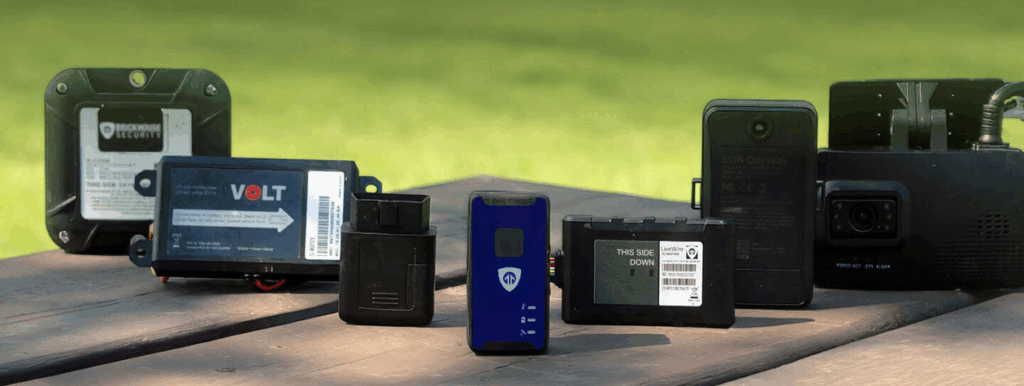Looking for the best GPS tracker for your vehicle? Whether you need to prevent theft, manage a fleet, or keep an eye on your car’s location, a GPS tracker for vehicle is vital. This article will guide you through the top choices in 2025, their features, and how they can meet your needs.
Key Takeaways
- GPS trackers utilize satellite technology and cellular networks for real-time vehicle monitoring, enhancing security and management capabilities.
- Key features to consider when choosing a GPS tracker include real-time tracking, geofencing, alert systems, and installation type (portable, OBD II, or hardwired).
- Subscription plans and technical specifications, such as battery life and reporting frequency, are crucial in selecting a GPS tracker that meets user needs effectively.
Understanding GPS Trackers for Vehicles
GPS trackers utilize GPS technology and cellular networks to monitor a vehicle’s location, providing real-time updates. These devices receive signals from a network of satellites, triangulating their position to determine precise locations. This technology allows for worldwide coverage, making it possible to track vehicles across international borders. The applications of GPS trackers are vast, ranging from vehicle tracking for theft prevention to fleet management and monitoring valuable items or individuals.
GPS trackers function by receiving signals from satellites orbiting Earth to pinpoint their tracker’s location. This information is transmitted through cellular networks, enabling real-time updates. Understanding how gps trackers work can enhance their effectiveness.
GPS trackers provide reliable real-time tracking and precise location monitoring, whether for personal vehicle security or fleet management, ensuring peace of mind and efficiency.
Key Features of Vehicle GPS Trackers
When evaluating GPS trackers, key features such as:
- Real-time tracking: allows users to monitor their vehicle’s location continuously, ensuring they are always aware of its whereabouts.
- Geofencing: enables users to set virtual boundaries and receive alerts when a vehicle enters or exits these zones. This feature is particularly useful for fleet managers who need to keep track of fleet vehicles.
- Alert systems: provide notifications related to vehicle status or movements.
These features stand out as important considerations.
Alerts are a critical component of GPS tracking devices. Customizable alert features allow users to receive notifications for various events, such as speed violations, low battery, or unauthorized movement. These alerts can be sent via text messages, email alerts, or app notifications, providing timely information that alerted can prevent potential issues.
Together, these features make GPS trackers indispensable tools for vehicle tracking, offering enhanced monitoring capabilities and peace of mind.
Types of Vehicle GPS Trackers
Vehicle GPS trackers come in several types, each suited for different needs. The main types include:
- Portable GPS trackers: Compact and can be placed in various locations within the vehicle, offering flexibility and ease of use. Ideal for individuals who may need to move the tracker between different vehicles.
- OBD II port trackers
- Hardwired trackers
OBD II port trackers plug directly into the vehicle’s OBD II port, providing easy installation and power directly from the vehicle. These trackers are often used for monitoring vehicle’s OBD II port diagnostics and performance.
Hardwired GPS trackers, on the other hand, are installed by connecting to the vehicle’s electrical system, providing a constant power source and making them difficult to remove. This makes hardwired GPS trackers a secure option for long-term vehicle tracking.
Choosing the Right GPS Tracker for Your Vehicle
Selecting the right GPS tracker involves considering several factors, including subscription plans, costs, and technical specifications. Monthly fees can vary significantly, with some brands offering lower hardware costs but higher ongoing fees, while others have higher upfront costs with no additional charges.
The tracker must meet your specific needs, whether for personal use or fleet management. Considerations like battery life, reporting frequency, and user interface complexity are crucial for making an informed decision.
Subscription Plans and Costs
Real-time GPS trackers typically require a subscription for continuous tracking, which includes:
- A monthly fee for cellular network access
- Fees that can range from modest monthly charges to more substantial annual subscriptions, depending on the service provider and the level of functionality offered
- For example, the GPS Tracker Pro starts at €7.95 per month, with costs varying based on the type of GPS tracking service provided
- Subscriptions cover the cost of cellular data for location transmission
- Real-time alerts
- Customer support
These subscriptions provide comprehensive tracking solutions.
Opting for a GPS tracker with a subscription data plan can enhance functionality and reliability. Annual subscriptions offer flexibility and can be more cost-effective over time. These plans ensure that users have access to real-time data, network upkeep, and essential features that enhance the overall tracking experience.
Evaluating Technical Specifications
When evaluating GPS trackers, technical specifications are paramount. Key factors include:
- Battery life, which impacts how often the device needs recharging.
- Reporting frequency, such as a tracker offering one-minute reporting by default.
- Configurability for more frequent updates without additional costs, which is highly beneficial for continuous monitoring.
The complexity of the interface is another important consideration. A user-friendly app that provides detailed tracking information is essential for both personal and fleet use. Advanced features like customizable reporting and alert systems can significantly enhance the usability and effectiveness of GPS trackers.
Selecting a device that aligns with your specific needs and preferences ensures accurate vehicle monitoring with the right tool that is monitored.
Benefits of Using GPS Trackers in Vehicles
GPS trackers offer numerous benefits, making them valuable tools for both personal and business applications. They serve as:
- Robust security solutions, providing real-time tracking to prevent theft and recover stolen vehicles.
- Tools for fleet vehicle management by monitoring driving behavior and operational efficiency.
- Means to ultimately reduce costs through efficient management.

Additionally, advancements in GPS tracking technology have enhanced features and increased reassurances about vehicle safety. Whether for individual use or managing a fleet, GPS trackers provide significant advantages.
Enhanced Vehicle Security
One primary benefit of GPS tracking devices is enhanced vehicle security. These systems send alerts when vehicles operate outside designated hours or areas, helping to prevent theft. By setting up geofences, users can receive notifications if their vehicle moves beyond a set boundary. This level of monitoring is invaluable for preventing car theft and ensuring the safety of valuable assets.
Whether tracking a personal car or delivery vehicles, GPS trackers offer an effective means of safeguarding against vehicle thefts and cars.
Fleet Management Efficiency
For fleet managers, GPS trackers are indispensable tools for improving operational efficiency. Real-time data from GPS trackers aids in making informed decisions, leading to reduced operational expenses. Devices like the Optimus 3.0, with advanced alert options and extensive reporting capabilities, are tailored for fleet management.
Fleet managers can use data analysis techniques to generate reports summarizing vehicle usage and travel habits, further optimizing operations. GPS trackers significantly enhance fleet management through effective fleet tracking.
Ultimate GPS Trackers for Vehicles in 2025
Navigating the plethora of GPS trackers available can be daunting. To simplify your decision, we’ve reviewed the top best gps tracker for vehicles in 2025, including:
- LandAirSea 54: a versatile option
- Apple AirTag: an economical choice
- Spytec GL300: known for reliability
- Optimus 3.0: an industrial-grade device
These devices offer a range of features to meet various forms of tool needs for drivers.
Each tracker excels in different areas, providing reliable real-time tracking and advanced functionalities to enhance vehicle security and fleet management.
TrackPort OBD GPS Tracker:
TrackPort OBD GPS tracker is the easiest way to track a car or truck without worrying about battery life. The device simply plugs into the vehicle’s OBD port, usually located under the driver’s side dash. The internal backup battery keeps the device online, even when the vehicle is off. And if the TrackPort is tampered with or disconnected, you’ll get an alert. Track any vehicle in real-time with the TrackPort OBD GPS Tracker.
- Plug-and-play design — installs in seconds via your vehicle’s OBD-II port
- Real-time GPS tracking with 4G LTE connectivity
- Mobile & web access for live location updates
- Geofencing & driving alerts (speed, braking, ignition)
- Trip history & reporting for mileage and route tracking
- No wiring or tools needed — easy to move between vehicles
LiveWire Volt
BrickHouse Livewire Volt is a DIY hardwired gps tracker for those who desiring a wired GPS solution. It offers reliable 4G GPS tracking like other hard wired gps trackers. With the Livewire Volt, however, there is no need to pay a mechanic for installation.
After a simple two wire connection to your vehicle’s battery, the device is ready. Livewire Volt can send real time location data without needing to be recharged or maintained, regardless of where your car battery is. Installing next to the battery also ensures a reasonable level of covert tracking in most practical situations.
- Hardwired power – no charging needed
- Real-time GPS tracking with 4G LTE
- App & web access for live monitoring
- Geofencing & smart alerts (speeding, ignition, tampering)
- Discreet install for covert use
- Trip history & reports for accountability
Lightning GPS
Lightning GPS platform equips you with all the advanced tracking features professionals rely on. Using the Lightning GPS mobile app for Android and iOS, you can monitor your vehicles or assets in real time from anywhere. The platform offers instant alerts via email or text message whenever your tracker enters or exits a defined area, begins moving, or exceeds a preset speed—helping you stay informed and respond quickly.
In addition to live monitoring, Lightning GPS provides detailed travel history reports that go back up to 90 days, making it easy to review trip routes, stops, and driver behavior. Live location data refreshes every 60 seconds by default, with the option for faster updates if needed—ensuring you never miss a moment when every second counts.
- Our smallest, most versatile GPS tracking device
- SOS button triggers custom alerts
- Moisture-resistant magnetic case included
- 4G cellular coverage throughout the US, Canada, and Mexico
- Affordable Service Plans as low as $17.99.
Optimus 3.0
Engineered for industrial-grade tracking, the Optimus 3.0 is suitable for fleet use, offering advanced features and extensive reporting capabilities. This GPS tracker is compatible with user-friendly apps available for both iPhone and Android apps, ensuring ease of use and comprehensive tracking.
With its compact design and robust functionalities, the Optimus 3.0 is a game-changer for fleet managers seeking reliable and efficient vehicle monitoring, making it an essential tool for every driver.
Installation and Maintenance of GPS Trackers
Installing and maintaining GPS trackers ensures optimal performance and longevity. Key points include:
- Hidden GPS trackers connect to the OBD II port.
- They can also be installed through hardwired methods for discreet monitoring.
- Proper installation and maintenance prevent malfunctions and ensure effective operation.
Following detailed installation video guides and performing routine maintenance maximizes the benefits of GPS tracking devices.
Installing Portable GPS Trackers
Portable GPS trackers offer flexible installation, as they can be placed anywhere in the vehicle with a clear car gps signal. Secure them with double-sided tape or zip ties, and position them facing upwards for optimal performance.
This ease of installation makes portable GPS trackers a convenient option for users who need to move the device between different vehicles or locations.
Hardwired GPS Trackers Installation
Hardwired GPS trackers provide a consistent power source and are difficult to remove, making them ideal for long-term vehicle tracking. To install a hardwired GPS tracker, locate the vehicle’s electrical system, disconnect the battery, and connect the device’s power wires to the ignition or constant power source.
Always ensure the vehicle is powered off, use insulated tools, and check connections before reconnecting the battery to prevent short circuits and ensure safety.
Maintaining Your GPS Tracker
Maintaining your GPS tracker ensures optimal functionality. Essential maintenance tasks include:
- Periodic diagnostics
- Checking for loose wires
- Ensuring a secure mount
- Monitoring battery life
- Performing regular firmware updates to enhance performance and security.
Proper maintenance will maximize the lifespan and reliability of your GPS tracking devices.
Maximizing the Use of GPS Trackers
Maximizing the use of GPS trackers involves:
- Setting up geofences and alerts
- Analyzing location data
- Performing regular maintenance tasks such as checking for loose connections and ensuring the tracker is securely mounted
Fully utilizing GPS tracker features enhances monitoring capabilities, ensuring vehicles are always protected and efficiently managed.
Setting Up Geofences and Alerts
Geofences are virtual perimeters that trigger notifications when a device enters or exits designated areas. Users create geofences by selecting points on a map to define alert zones, customizable in size and shape for tailored monitoring.
Configuring entry and exit alerts for these zones enhances real-time monitoring, providing instant alerts via SMS, email, or app notifications. This method is effective for monitoring vehicle movements and ensuring security.
Analyzing Location Data
Analyzing location data is crucial for maximizing the benefits of GPS tracking. GPS trackers offer:
- Historical playback of tracked movements, allowing users to review their trips over specified time intervals.
- A feature known as location history, which enables users to visualize their routes.
- The ability to export data for further analysis.
Examining location data helps users identify patterns and make informed decisions about vehicle usage and efficiency, enhancing the overall utility of GPS tracking devices and ensuring an accurate location.
Legal Considerations for Using GPS Trackers
The legality of using GPS trackers depends on location and purpose:
- It is generally legal to use them on vehicles that you own.
- Purchasing GPS trackers is legal.
- Owning GPS trackers is also permitted.
- Tracking someone else’s vehicle without their consent can lead to legal repercussions due to anti-stalking laws in many states.
Employers can legally track company-owned vehicles without needing employee consent in many states, although specific state laws may impose additional requirements. To ensure compliance, individuals should check specific state laws or consult a legal expert before using GPS tracking devices.
Summary
GPS trackers have become vital tools in 2025, offering enhanced vehicle security and efficient fleet management. By understanding the key features, types, and benefits of GPS trackers, users can make informed decisions to protect and optimize their vehicle usage. 
The top GPS trackers of 2025, including the LandAirSea 54, Apple AirTag, Spytec GL300, and Optimus 3.0, provide a range of functionalities to meet various needs. Proper installation, maintenance, and maximizing the use of GPS trackers ensure their longevity and effectiveness. Embrace the power of GPS trackers to safeguard your vehicles and enhance operational efficiency.
Frequently Asked Questions
Do I need a subscription for GPS trackers?
Yes, real-time GPS trackers usually require a subscription for ongoing tracking, as this includes a monthly fee for cellular network access.
Can I track my vehicle internationally with a GPS tracker?
Yes, you can track your vehicle internationally with a GPS tracker, provided it offers worldwide coverage and is compatible with the necessary network capabilities.
How do geofences work in GPS trackers?
Geofences create virtual boundaries that activate notifications when a GPS tracker enters or exits specified locations, allowing for improved real-time monitoring. This technology effectively helps in tracking and managing assets or individuals within designated areas.
Is it legal to use a GPS tracker on someone else’s vehicle?
It is illegal to use a GPS tracker on someone else’s vehicle without their consent, as this violates anti-stalking laws. Always obtain permission to avoid legal consequences.
What are the key features to look for in a GPS tracker?
When selecting a GPS tracker, prioritize real-time tracking, geofencing capabilities, customizable alerts, and an intuitive user interface. These features ensure you find a GPS tracker that meets your specific requirements effectively.

